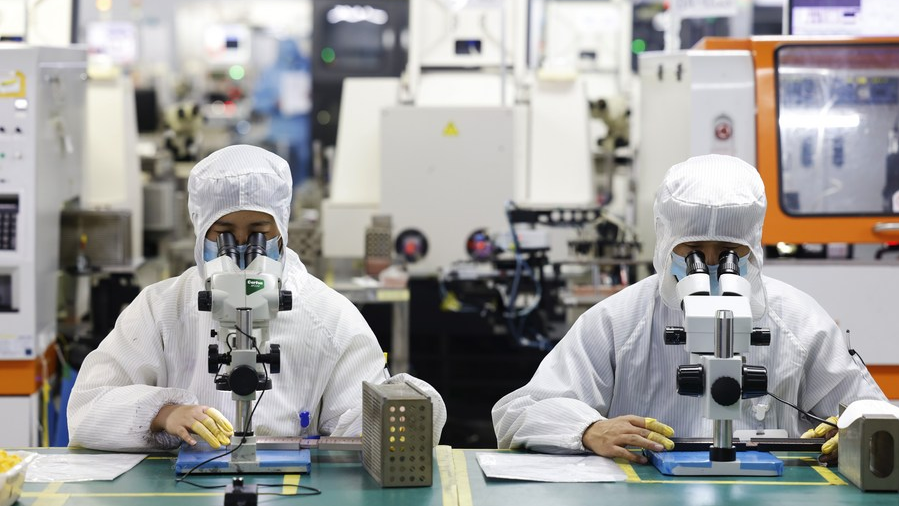U.S. Tech Decoupling Poses Risks to Allies

The United States ultimately opposes the idea of other countries integrating for common prosperity and strives to create fractures through the promulgation of geopolitical conflict in order to sustain its dominance.
The United States is pursuing an ever-expanding technology war against China. Aiming to maintain a monopoly over high-end supply chains, and by extension, military dominance, it is doing everything it can to try and block China’s rise in high-end manufacturing and technological advancement. Its primary logic of doing so is that of “embargo.”
Beginning with the Trump administration, the U.S. has blacklisted a growing list of Chinese tech companies, prohibiting them from receiving American-made technology through the Department of Commerce’s “entity list” and the more severe “foreign direct product” rule, which prohibits the U.S. held patents or “technology” anywhere in the world from being used when doing business with targeted entities.
This use of long-arm jurisdiction was first deployed against Huawei in order to forcibly isolate it from the global semiconductor supply chain, but starting in November last year the U.S. has sought to impose the rule on all Chinese chipmakers in an attempt to hobble their ability to obtain semiconductor manufacturing equipment and slow their rise in capabilities.
As the U.S. does not have complete control over the entire semiconductor industry, but seeks to do so, part of this effort has involved coercing allied countries to follow suit, even if it comes at a cost to the given ally in the process. For example, the U.S. has frequently sought to pressure its allies to block Chinese acquisitions in any firms relating to chip or semiconductor technology. It demanded the U.K. make a U-turn on a Chinese-owned firm’s acquisition of Newport Wafer Fab, even though it did not genuinely represent a “national security risk.”
In addition, the United States is deliberately eroding the semiconductor manufacturing capabilities of its allies by coercing leading firms to invest in capacity inside of the U.S. and pursuing large-scale industrial subsidies, which will erode the trade balance of the impacted countries. Across the board, the U.S. is tearing up the global semiconductor supply chain, and forcing its allies to forego China, the world’s largest and most important semiconductor market.

The latest addition to this effort is the coercive push to force the Netherlands and Japan to follow its restrictions on the export of semiconductor manufacturing equipment to China. Negotiations have been going on behind the scenes for a long time. However, recently, unnamed U.S. officials have repeatedly leaked claims to the press that a “deal” has been reached and that the two countries have agreed to follow suit, although it is not clear what form the final agreement will take, which will reportedly never be publicized. However, it has gone through despite aggressive resistance to such a proposal by the respective industries in both countries.
In particular, ASML of the Netherlands – one of the world’s leading chip-making equipment manufacturers – has repeatedly warned that such restrictions will place the company at a disadvantage, because it will force China to reinvent the technology themselves and cost them access to the market. The company had already experienced similar economic coercion from the United States when it was prohibited from exporting an extreme ultraviolet lithography machine to China in 2018. Now, the U.S. wants the firm to stop sending any machine capable of constructing chips at 14 nm and below to China as well, despite the huge level of demand and potential sales.
Under the last two administrations, the United States has been taking delight in destroying globalization in the name of “America First.” Seeing the world purely in terms of its own hegemony and dominance, it ultimately opposes the idea of other countries integrating for common prosperity and strives to create fractures through the promulgation of geopolitical conflict in order to sustain its dominance. This involves demanding and forcing allies to sacrifice their own economic well-being and prosperity in order to fulfil Washington’s agenda against target countries, pursuing “decoupling.”
The result is that U.S. allies become weaker and ultimately dependent upon American power. As the U.S. subsequently rages its technology war against China in pursuit of containment, compliance and obedience to American policies will cut off impacted countries from the world’s largest market and have a detrimental impact on their prosperity. It remains a fundamental truth that the Chinese market is critical for the Japanese economy, and that the two countries cannot afford to be locked in deepening geopolitical conflict, an outcome which will be adverse not just to Asia, but the world.
 Facebook
Facebook
 Twitter
Twitter
 Linkedin
Linkedin
 Google +
Google +







